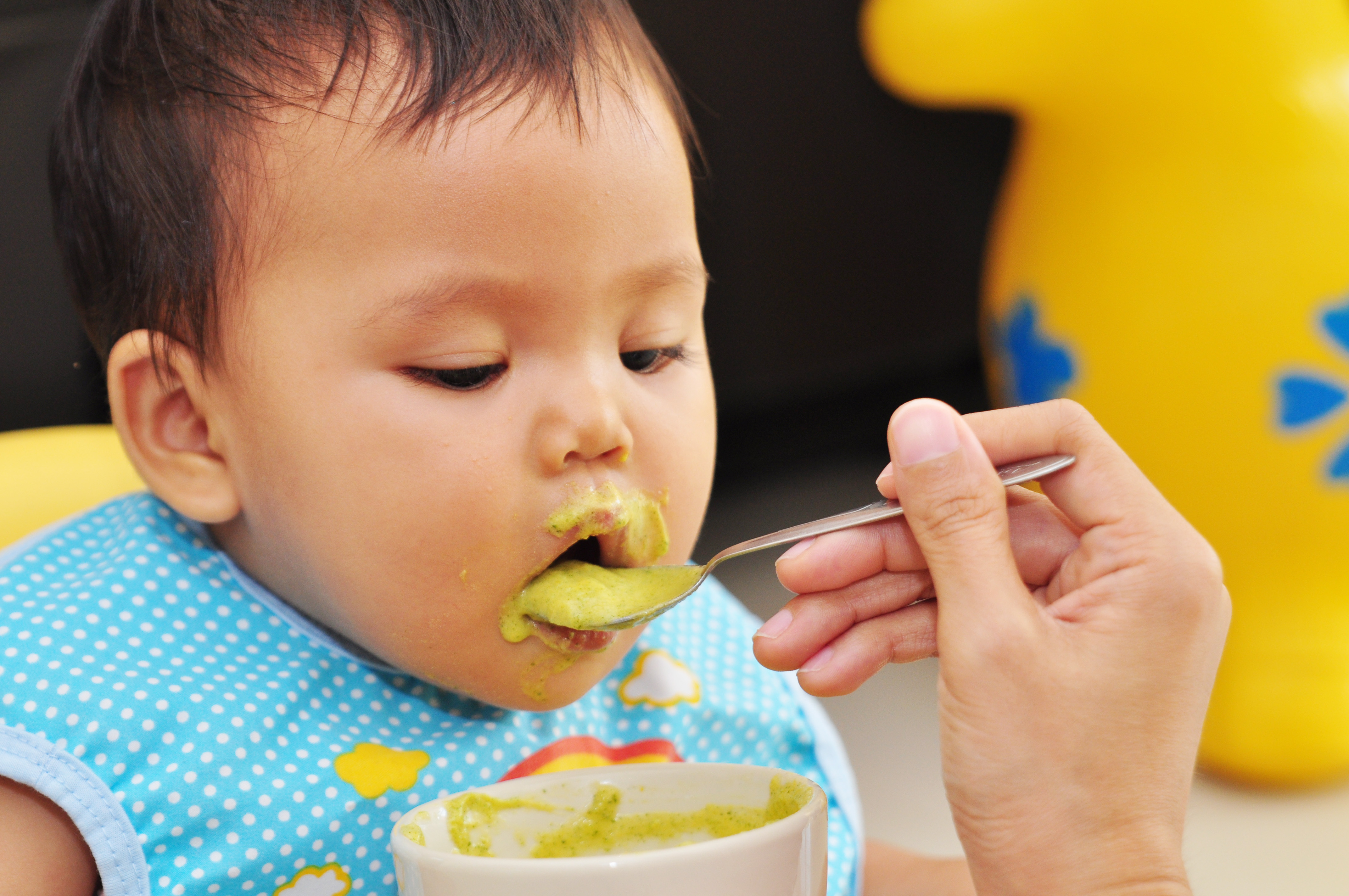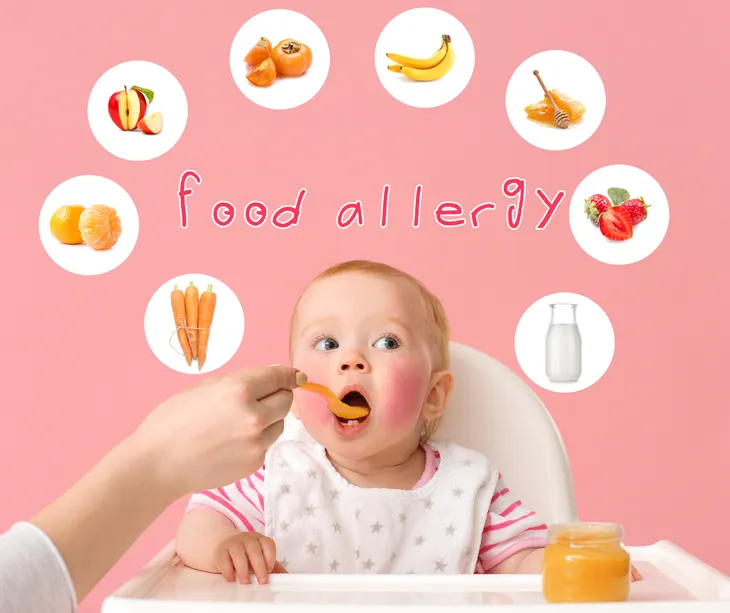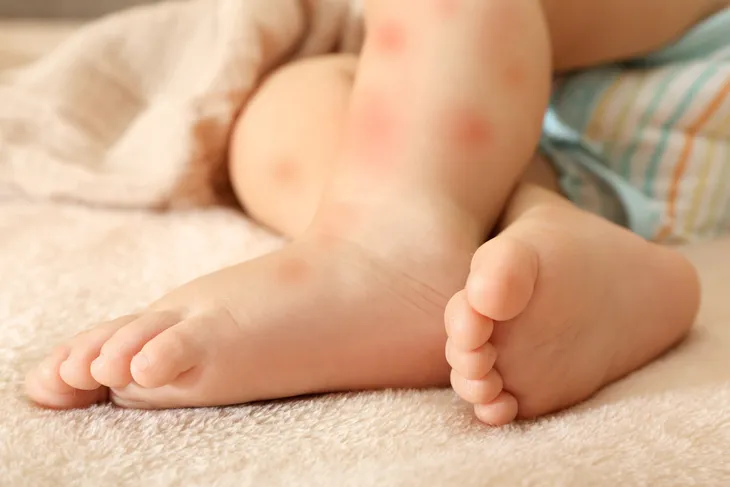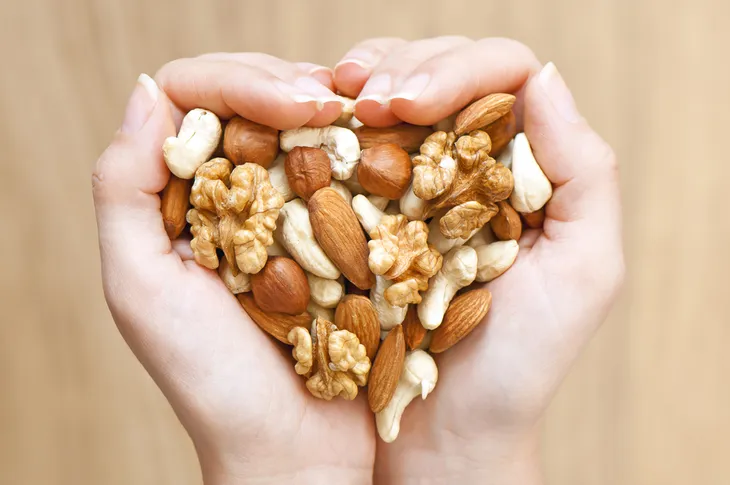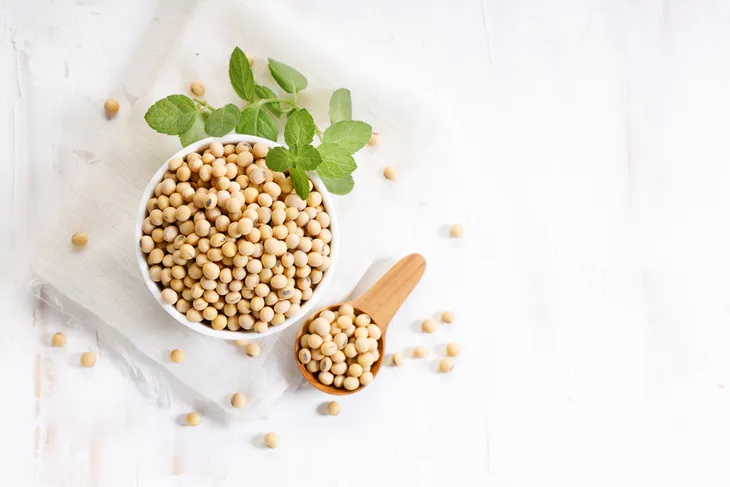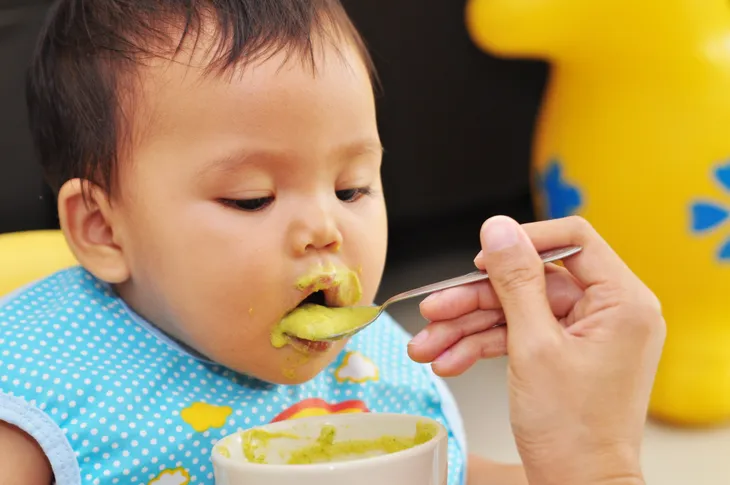- Introduce new foods gradually. If there is an allergic reaction, it’s not hard to determine what food is responsible.
- Food allergy signs and symptoms include stomach pain, hives or rash, nausea, vomiting, tightness in throat, diarrhea, swelling of the lips, face, tongue or limbs, etc.
- The most common food allergies are milk, nuts, fish and shellfish, eggs, soy, and wheat.
- New research shows introducing high-risk allergen foods early can avoid potential allergies from developing. Always consult a doctor first.
When your little one starts solid foods it is an exciting milestone! However, it often comes with a lot of questions and concerns, especially about food allergies. It can be a very nerve wracking time for parents with all of the unknowns. Parents can better prepare themselves by getting educated on common food allergies, as well as what to do in the case of an allergic reaction.
In this article we’ll answer some of the most commonly asked questions about infant food allergies. We’ll also provide tips for starting your little one on solids and how to recognize the most common foods and food groups allergens and their reactions. Let’s take a look…
Tips for Starting Solids with an Infant
When feeding a baby solids for the first time, it’s important to introduce new foods gradually. Do one at a time. This is helpful in case there are any food allergies, parents can easily determine what the specific food is. For example, if you feed your baby many new foods throughout one day and they have an allergic reaction, you won’t know which food provoked it.
It is suggested parents wait three to five days before introducing a new food because some allergic reactions can be delayed. Each time you introduce a new food, you don’t have to eliminate the previous foods. If they didn’t react to them before, they are likely safe.
Food Intolerance vs. Food Allergy
These two things are often confused. A food intolerance presents symptoms that are generally less serious and often limited to digestive problems. A food allergy causes an immune system reaction that affects numerous organs in the body, causing a range of symptoms that can be severe or even life-threatening.
If your little one has frequent stomach issues after eating a particular food (ie. gas, bloating, diarrhea, cramping or vomiting) — they may have a food intolerance. Basically, their digestive system isn’t able to comfortably handle the food. As many as 15-percent of babies under 12-months have some sort of food intolerance. However, the severity can vary enormously. Sometimes an intolerance can last a few days, other times it may persist. It doesn’t necessarily mean they will never be able to eat that food — try introducing it again in 8 weeks. The problem often goes away.
Food Allergy Signs and Symptoms
Did you know there are over 160 food possible food allergens? About 8-percent of babies have food allergies. When an infant is exposed to a particular food, their immune system essentially overreacts, and releases chemicals that cause allergy symptoms. When the baby eats that food again, they will quickly begin to experience symptoms that range in severity.
The most common symptoms of a food allergy in babies and toddlers include:
- Belly pain
- Coughing
- Diarrhea
- Fainting
- Hives or rash
- Nausea or vomiting
- Red rash around the mouth
- Runny or stuffy nose
- Swelling of the lips, face, tongue, legs, or arms
- Tightness in the throat, trouble breathing, or wheezing
Food allergies can cause sudden and serious life-threatening symptoms. If your child is having trouble breathing, it can cause their blood pressure to drop rapidly causing shock. Signs of shock include pale, clammy skin and dizziness. This type of reaction is known as anaphylaxis. If anaphylaxis occurs, call 911 — seek medical care right away!
The Most Common Food Allergens
Milk
A lactose intolerance and a milk allergy are not the same thing, however they are often confused. A lactose intolerance is when you can’t digest lactose, the sugar that is found in dairy products. This usually presents symptoms like stomach pain, gas, and diarrhea. A milk allergy has symptoms that affect more than just your digestive tract. A milk allergy causes your immune system to think dairy is a foreign invader and attacks it by releasing chemicals known as histamines. Symptoms of milk allergies can range from wheezing to vomiting and bloody stool or diarrhea.
Sometimes parents wonder if their child is only allergic to cow’s milk. The answer is often no. Proteins in other milks, such as goat’s milk are similar to those in cow’s milk and can also cause a similar reaction. If your child has an allergy to milk, familiarize yourself with products containing milk. Dairy products are an important source of calcium, protein, and vitamins D and B12.
If your child has an allergy to milk, foods such as broccoli, spinach, and soy products can help fill the void. Look for soy or almond milks that are fortified with calcium and vitamin D if you are looking for a liquid substitute.
Peanuts & Tree Nuts
Nuts can do a lot of damage and cause some very severe allergic reactions for some people. Allergic reactions to peanuts can be caused by direct ingestion, skin contact, or even breathing in peanut dust. Some people are so sensitive that even indirect cross-contact can trigger a reaction. For example, if you were at a restaurant and one of the chefs cooking utensils came in contact with the nut allergen, trace amounts could get onto your meal and cause an allergic reaction.
Symptoms of nut allergies typically occur within minutes of exposure and typically include the following…
- Tightening in the throat
- Shortness of breath or wheezing
- Skin reactions such as hives or redness, runny nose, itching or tingling in the mouth or throat
- Diarrhea, nausea, stomach cramps, or vomiting
If your child has an allergy to peanuts, it does not mean they will have allergies to other nuts and legumes. Peanuts grow underground and are different from almonds, walnuts, cashews, and other tree nuts. Some studies have found that 25- to 40-percent of people who have a peanut allergy are allergic to tree nuts too. Tree nuts include: almonds, Brazilnuts, cashews, chestnuts, filberts, hazelnuts, hickory nuts, macadamia nuts, pecans, pine nuts, pistachios and walnuts.
Fish & Shellfish
Unlike other food allergies, which are typically first observed in babies and young children, an allergy to fish many not become apparent until adulthood, though it can certainly present itself early, so parents should still be on the lookout for allergic reactions when introducing seafoods to their children for the first time. Having an allergy to finned fish (such as tuna, halibut or salmon) does not mean that you are also allergic to shellfish (shrimp, crab and lobster).
Some allergists may recommend that individuals with a fish allergy avoid eating all fish, it may be possible for someone to be allergic to one type of fish, while safely being able to eat others. An allergist can help determine what other varieties may be safe to eat. Common fish allergy symptoms include: hives or a skin rash, nausea, stomach cramps, indigestion, vomiting and/or diarrhea, stuffy or runny nose and/or sneezing, headaches, asthma, or anaphylaxis — which is less common. Again, when dining out, even cross-contact can cause individuals with fish and shellfish allergies to react, so be mindful of this!
Eggs
Infants sometimes have an allergic reaction to eggs. The good news however, unlike peanut, tree nut and shellfish allergies that tend to persist, some allergies like eggs and milk often go away with time as a child gets older! Most kids outgrow this allergy by age 5 and can eat eggs with no problem after that. Egg allergies occur in children often because their immune system hasn’t fully developed and can’t handle the protein in eggs. Most children are allergic to the protein in the egg whites, while fewer cases are caused by reactions to the protein in the egg’s yolk.
A baby who is allergic to eggs may feel sick or get a rash after eating eggs or any food containing eggs. The reaction could happen fast or it might take a few hours. Signs and symptoms of an egg allergy include: hives, eczema, flushing, or swelling, belly pain, diarrhea, nausea, vomiting, itching around the mouth, runny nose, wheezing, difficulty breathing, rapid heartbeat, or low blood pressure. With any food allergy, it is important to remember that even mild reactions may get worse upon following exposures, so talk to your pediatrician about any food allergy symptoms in your baby.
Soy
Good news is that most children outgrow soy allergies too. Soy allergy symptoms may include: asthma, atopic dermatitis, colitis, diarrhea, eczema, fever, itching, vomiting, or wheezing. They typically appear within 48-hours after a child eats or drinks soy protein. Unfortunately, up to 50-percent of children who are allergic to cow’s milk may also be allergic to soy protein.
If you suspect your child has an allergy to soy, completely remove soy products from their diet, and contact your pediatrician. Under their guidance or supervision, they may ask you to cautiously reintroduce soy into their diet to see if the symptoms return. If your child does have an allergy to soy, you might want to keep a close eye on how they respond to other legumes such as peas, peanuts, lentils and garbanzo beans, as they may also be allergic to these.
Wheat
Most parents will introduce their babies to whole grain breads that include wheat around 8 to 9 months old. Wheat, along with dairy products, is one of the most confusing of the foods that we introduce to our babies. Since wheat is a common allergen, some people believe that it should be avoided until after 12 months, however, some studies show that delaying exposure until after 6 months of age was associated with an increased risk of allergy.
Recent studies suggest that introducing common allergen foods earlier rather than later may actually help prevent kids from developing allergies. If you have any questions or concerns, talk to your pediatrician. A child with a wheat allergy is likely to develop symptoms within minutes to hours. Wheat allergy symptoms include: swelling, itching or irritation of the mouth or throat, hives, itchy rash or swelling of the skin, nasal congestion, headache, itchy watery eyes, difficulty breathing, cramps, nausea or vomiting, diarrhea, or anaphylaxis. Most children with a wheat allergy outgrow it by ages 3 to 5 years.
My Child Might Have A Food Allergy, What Should I Do?
If your little one is having trouble breathing, has swelling of the face or lips, or develops severe vomiting or diarrhea after eating, call 911 immediately. Your child’s airway can close up within minutes, so skip calling the doctor or trying to drive your child to the emergency room — you will need paramedics on the scene as soon as possible.
If their symptoms are less severe and within two hours of eating a certain food, talk with your pediatrician. You may be referred to a pediatric allergist for testing. An allergist can confirm which foods are causing the problem and whether the symptoms are part of an immune reaction (indicating an allergy), or if they are signs that your child is unable to easily digest the food (indicating and intolerance).
Once your child experiences an allergic reaction to food, you will want to take all precautions and be prepared in case it happens again. Remember, even if their first reaction is mild, they might have a more severe reaction the next time. Talk to your doctor if you have even the slightest concern that your child has a food allergy. They will be able to provide you with an action plan, including instructions on how to manage an allergic reaction.
Do Genetics Impact Food Allergies?
Many parents wonder — are allergies are inherited? The answer to this question is that your child may in fact inherit the tendency to have allergies, but not necessarily inherit a specific allergy. Children, especially infants and toddlers, are more likely to develop food allergies if there is a family member who has food allergies, although it is not a certainty.
If one of a child’s parents has food allergies, there is a 50/50 chance the child will as well. The risk is elevated even further to 75-percent chance for families where both parents have allergies. Studies also show that children who suffer from eczema, are more likely to develop food allergies, too.
Food allergies can start at any age. A child with a food allergy is two to four times more likely to have other allergies and related conditions, such as dermatitis and asthma, than children who do not have allergies. The good news is however, that many children can outgrow their allergies, however allergies to peanuts, tree nuts, fish and shellfish are more likely to be lifelong allergies than other food allergies.
Can I Delay or Prevent Food Allergies?
In the past, many doctors recommended delaying the introduction of certain high-potential allergen foods to children with a family history of allergies. However, recent studies suggest that early exposure to potential food allergens could in fact decrease the likelihood of your child developing an allergy to that food. Many doctors recommend breastfeeding as long as possible. This may offer protection against allergies, especially if there is a family history of them.
While on the topic of breastfeeding, a baby may show signs of a food allergy even before they start formula or solid foods. Babies can develop allergies to foods that a breastfeeding mother is eating. Symptoms may include: diarrhea, blood stool, vomiting, colic, eczema, constipation and poor growth.
Always pay attention to signs of allergies, and talk to your pediatrician if you have any concerns. They may suggest removing certain foods from your diet to see if it affects your baby’s symptoms. You do not have to preemptively avoid certain foods when breastfeeding or during pregnancy. These are not going to increase your child’s risk of developing allergies.
